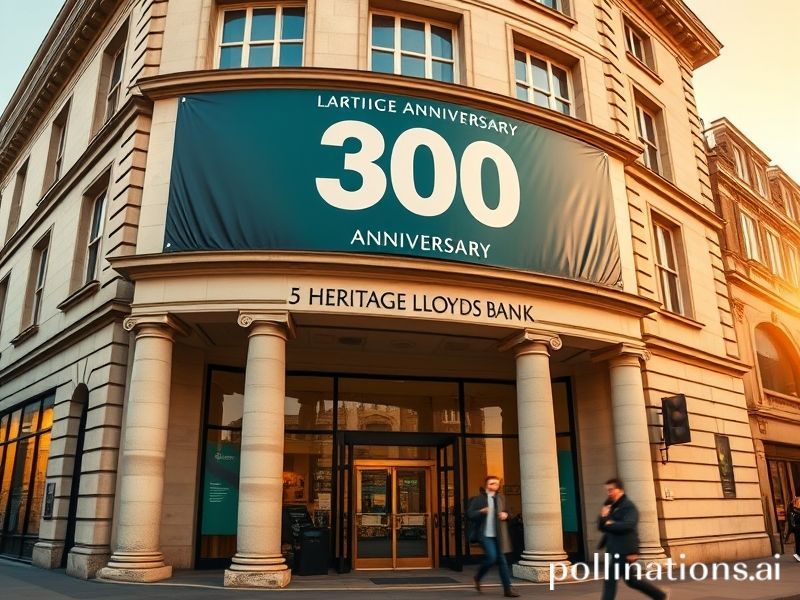Lloyds at 300: How a British Bank Outlived Empires, Pirates, and Its Own Scandals—And Still Charges Commission
LONDON – Somewhere between the third croissant and the fourth PowerPoint slide, the assembled dignitaries at Lloyds Banking Group’s tree-shaded headquarters remembered to mention that the institution had turned 300. The cake arrived in the shape of an outsized ship—an ironic confection, given that the City of London itself now resembles a vessel drifting without an agreed-upon map, occasionally firing flares labeled “innovation” at passing continents that no longer return its calls.
Three centuries ago, a coffee-stained ledger recorded Edward Lloyd’s willingness to insure sea captains who might, on a whim, be eaten by pirates. Today the bank insures algorithms that could, on a whim, eat your pension. Progress is rarely photogenic.
From Buenos Aires to Bangalore, the tricentennial is being watched with the sort of curiosity usually reserved for British royal weddings or new episodes of slow-motion constitutional self-harm. Lloyds is no longer simply “that bank with the black horse”; it is a trans-national experiment in how long legacy risk can be gift-wrapped as digital disruption before someone spots the duct tape. The answer, apparently, is 300 years and counting.
The global significance? Start with the numbers: £559 billion in assets, branches in half a dozen time zones, and a balance sheet that could absorb Uruguay’s GDP without burping. More importantly, Lloyds is a living museum of every financial fad since the South Sea Bubble. When the world wanted slaves insured, Lloyd’s was there. When the world wanted carbon credits offset, Lloyd’s was also—conveniently—there. The through-line is neither morality nor innovation, but an unmatched talent for charging a commission while history makes up its mind.
Yet anniversaries invite nostalgia, and nostalgia is the credit rating of the already-rich. So governors, CEOs and a stray duke gathered to toast “UK plc,” a corporate ticker that sounds increasingly like a remaindered aisle at Harrods. They spoke of “resilience,” a word financiers deploy when they mean “we survived our own mistakes, and you paid the bill.” They spoke of “green finance,” which is not, as you might hope, a recycling scheme for old scandals, but rather a new line of eco-bonds that promises to save the planet at a modest 3.5 % coupon.
Internationally, the spectacle lands differently. In the eurozone, Lloyds’ birthday reminds regulators that British banks are now third-country guests at the buffet, clutching non-tariff paperwork instead of a plate. In China, state media frames the celebration as proof that Western finance is a geriatric circus kept alive by quantitative-elephant tranquilizers. In Washington, senators who still confuse Lloyds with the insurance market of the same name ask whether, if it’s “too big to fail” overseas, America should perhaps draft its own 300-year contingency plan—an imperial attention span rarely observed outside fossil-fuel subsidies.
But perhaps the real audience is smaller: anyone under 35 who has never written a cheque yet still pays rent to a buy-to-let landlord whose mortgage is sliced, bundled and re-insured somewhere inside Lloyd’s vast paper intestine. The irony is exquisite; a bank old enough to have financed Wellington’s boots now underwrites the Wi-Fi enabled shoebox in which you stream documentaries about financial inequality. History doesn’t repeat itself—it refinances.
So, what next for the next century? Having survived Napoleonic wars, two global depressions and the 1980s hairstyles of its own board photos, Lloyds faces the one risk it never priced: indifference. Digital currencies, decentralized ledgers and a generation that regards “branch” as a software term may succeed where Spanish cannons failed. The black horse could yet be rendered a nostalgic emoji, neighing softly in a WhatsApp chat before being muted by a thumb.
Still, never underestimate an institution that has turned catastrophe into an annuity for three centuries. Somewhere in a climate-controlled vault rest scrolls bearing signatures of sailors who never came home and, beside them, contracts covering satellites that haven’t yet fallen from orbit. The ink changes, the planet spins, the commission remains.
Happy 300th, Lloyds. May your next iceberg be gluten-free.







